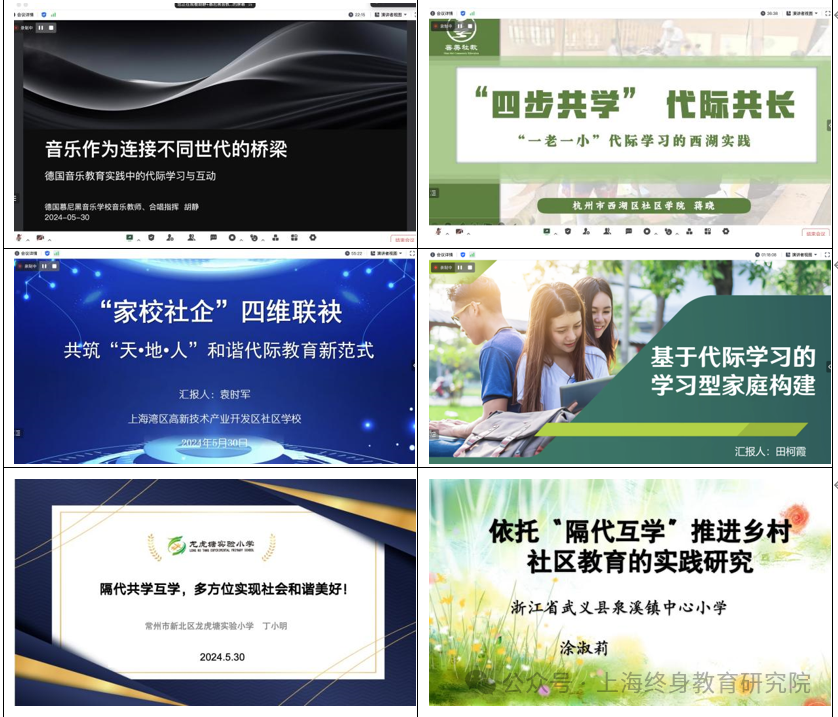East side of 7th Floor, No. 3663, North
Zhongshan Road, Shanghai, China, 200062
Tel: +86 21 6223 2322
www.smile.ecnu.edu.cn
On the evening of May 30th, the academic salon on "Intergenerational Learning Research: Practical Progress and Academic Dialogue (III)" was held via Tencent Meeting. The event was co-hosted by the Shanghai Municipal Institute for Lifelong Education (SMILE) of East China Normal University, the Institute of Schooling Reform and Development of East China Normal University, and the National Research Alliance on Intergenerational Learning.
The salon invited six guest speakers, including Hu Jing, a choir conductor and music teacher from the Munich Music School in Germany; Jiang Xiao, dean of theCommunity College, West Lake District, Hangzhou, ZhejiangProvince; Yuan Shijun, principal of the Community School in the Shanghai Bay Area Hi-Tech Industrial Development Zone; Tian Kexia, the person in charge of family education at Lishui Open University in ZhejiangProvince; Ding Xiaoming, vice principal of Longhutang Experimental Primary School in Xinbei District, Changzhou, JiangsuProvince; and Tu Shuli, a senior teacher at Quanxi Town Central Primary School in Wuyi, ZhejiangProvince.
The six speakers successively shared keynote presentations on the theme of intergenerational learning, including "Music as a Bridge Connecting Different Generations: Intergenerational Learning and Interaction in German Music Education Practices," "Four-Step Collaborative Learning: Intergenerational Growth in West Lake's Practices," "A New Paradigm of Harmonious Intergenerational Education Involving Families, Schools, Communities, and Enterprises: The Case of Community School in the Shanghai Bay Area Hi-Tech Industrial Development Zone," "Building Learning Families Based on Intergenerational Learning," "Exploring and Practicing Social Harmony through Intergenerational Learning," and "Practical Research on Promoting Rural Community Education through Intergenerational Learning."
The event was chaired by Zhang Beilei, principal of Tinglin Primary School in Jinshan District, Shanghai, the rotating chair school of the National Research Alliance on Intergenerational Learning. The salon also invited several experts for commentary, including Xiong Jun, president of Guangzhou Open University; Ouyang Zhongming, director of the Education Department and dean of the College of Education of Jiangxi Science and Technology Normal University; and Ma Lihua, associate professor from the Faculty of Education, East China Normal University.
President Xiong stated, "As times evolve, the cultivation of imagination plays an important role in the overall improvement of education, including the high-quality development of intergenerational education, and will also benefit the realization of lifelong learning."
Professor Ouyang pointed out, "The common needs among different generational subjects, that is, the joint interests, are the most important factors in developing intergenerational learning projects."
Associate professor Ma noted, "Potential risks inintergenerational learning need to be considered, such as parental absence, intergenerational conflicts, and the over-reliance on experience from the elderly that might limit the independent thinking and innovation of younger generations."
At the end of the event, Li Jiacheng, executive vice president of SMILE,delivered a concluding speech. He pointed out that, in the context of today's educational practices and theoretical research, intergenerational learning is still a relatively new concept.
In a certain sense, it may change many of our existing forms of basic education, elderly education, family education, and workplace learning.
He suggested that future research on intergenerational education should continuouslyfocus on three areas: first, enhancing sensitivity to educational benefits; second, deepening research on learning quality; and third, valuing the pursuit of lifevalue and meaning.
It is known that various research institutions , including SMILE, universities for the aged, primary and secondary schoolsacross the country, are actively promoting the practical developmentand theoretical researchof intergenerational learning. Preparations for the fourth online academic salonare already underway, and the annual meeting of the "National Alliance for Intergenerational Learning Research" is also approaching.
